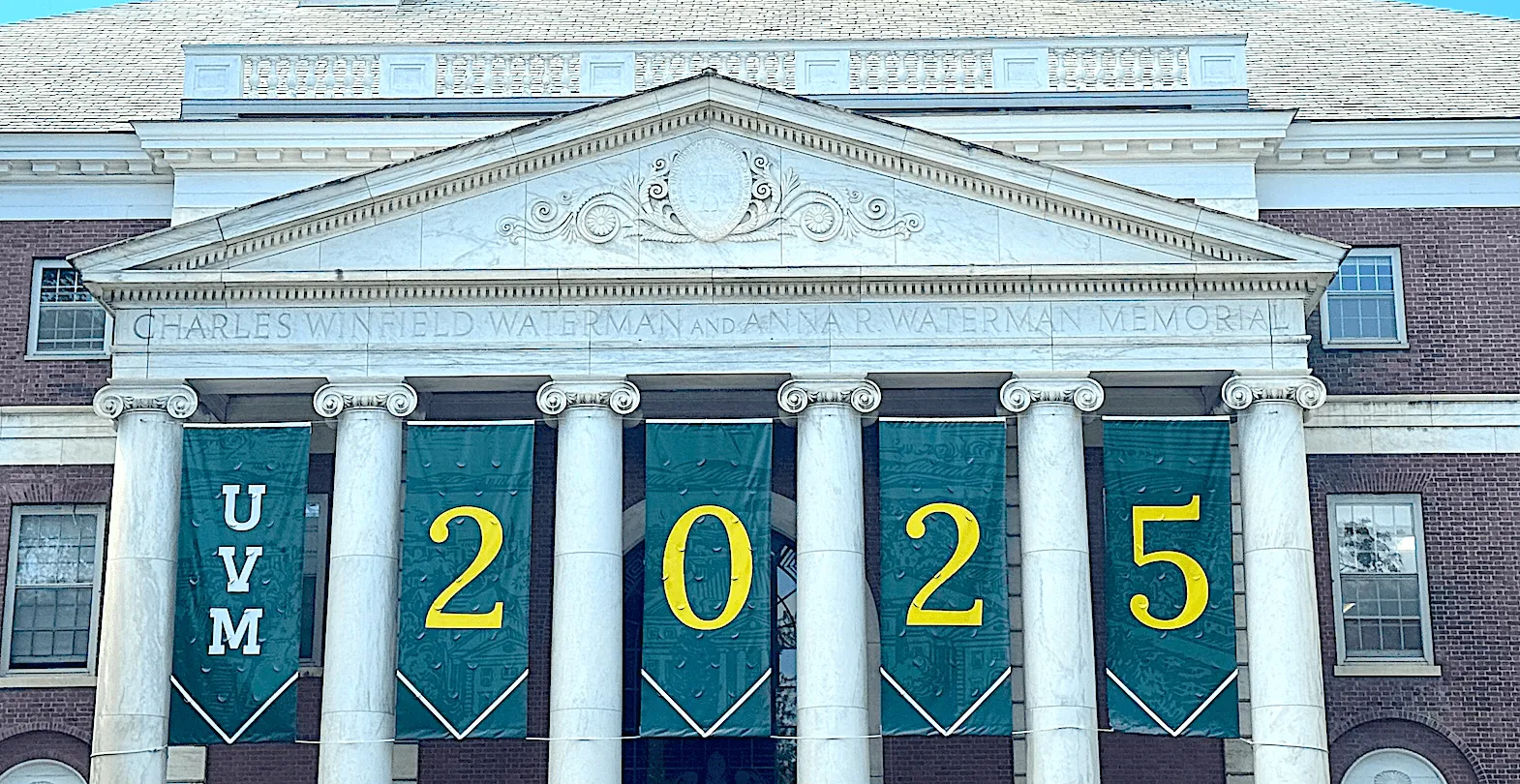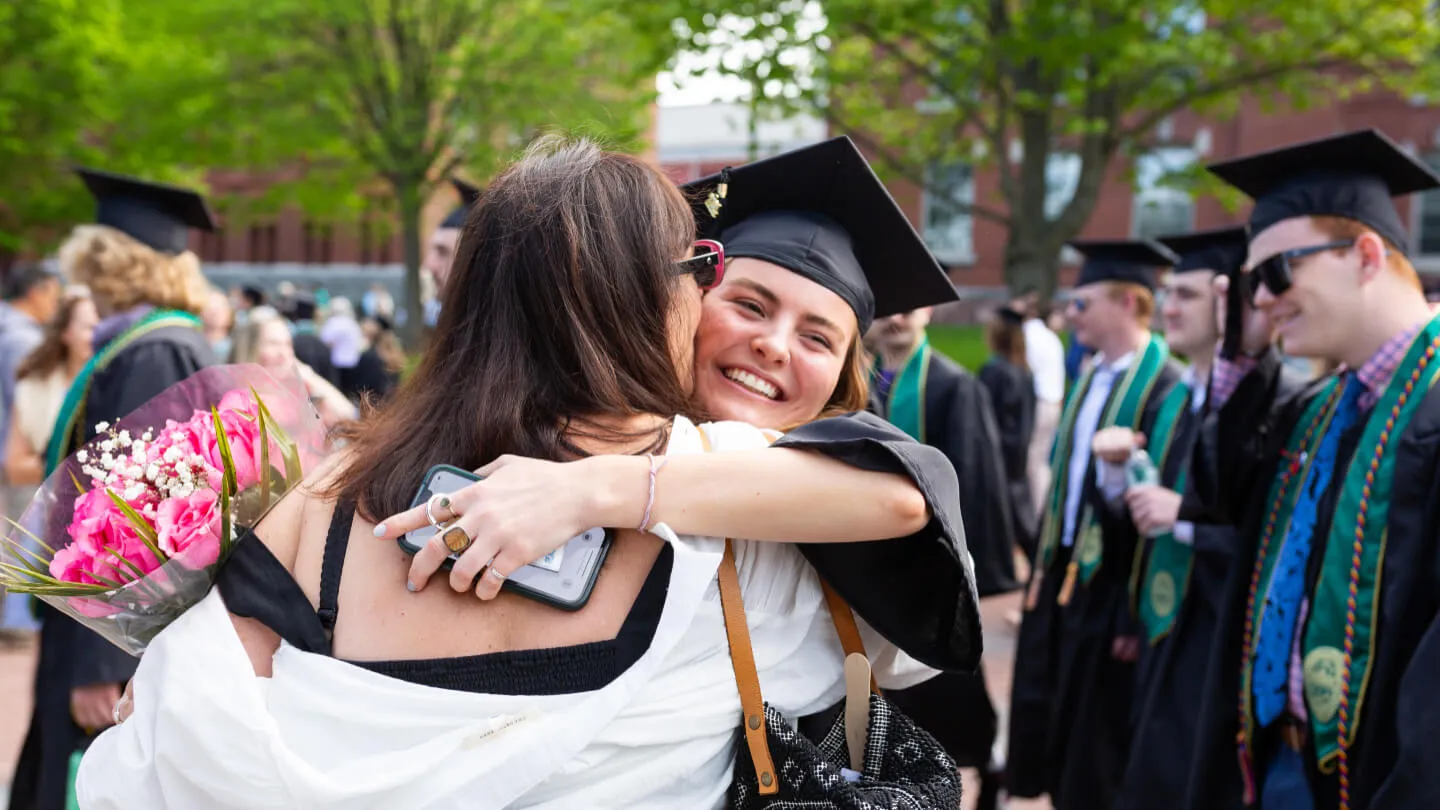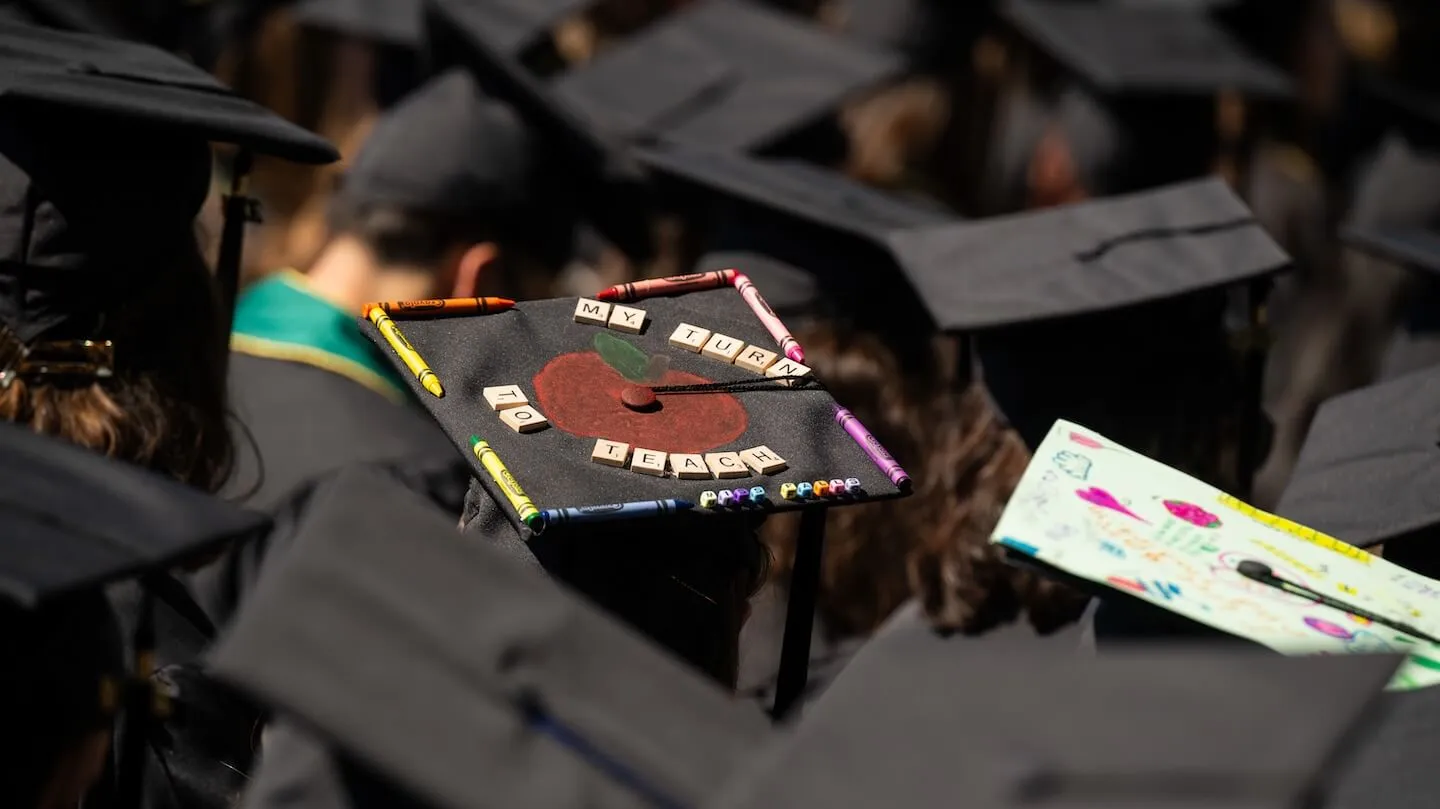Most of the May graduates began college in the fall of 2021. Global deaths from Covid-19 topped five million that year. It was a time of great uncertainty and escalating challenges, yet these students embarked on one of the biggest transitions of their young lives. While they began in an era of difficulties they have emerged with remarkable accomplishments and commendable achievements. Here are just a few of the hundreds of amazing CALS undergraduate students who have earn their degrees this year.
When Sophia Bright visited the UVM campus from Amity Harbor, New York in February of 2021 there were no tours due to Covid, so she looked around on her own trying to make up her mind whether UVM would be the right fit for her. She chose UVM and began as a biological science major with a dance minor. But the Intro to Animal Science course she took her first year awakened her interest in veterinary science, and set her on another path to change her major and become pre-vet.
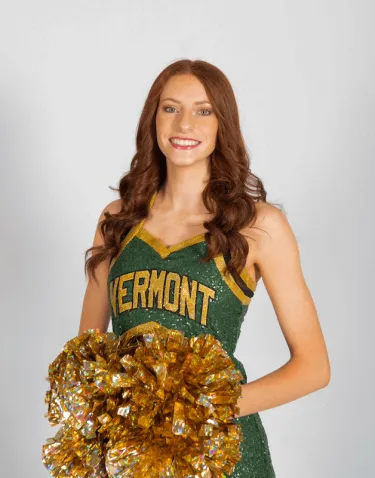
As for adding dance as a second major, she attributes that change to the influence of her mentor Paul Besaw, founder of the UVM dance program. "He has really just been an amazing professor for dance and taught me more about the history and creative side of dance, not just actually moving…and it's just been great working with him, and I'm gonna miss him.”
Sophia was on the club dance team for four years and was the team’s captain this past year. “It's been absolutely amazing performing at all the men's and women's basketball games. And then for the past three years I've traveled with the men's and women's team to March Madness, which has been so fun and so exciting to see them play at the national level.”
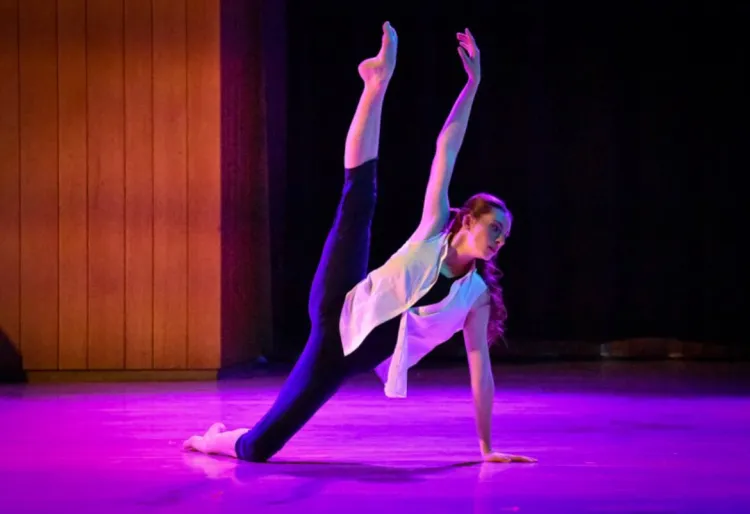
She credits her public speaking course and dance as having improved her leadership abilities while at UVM, “Being captain, having to lead my team and run every practice, communicate with athletics and our coach, and make sure everyone's informed about everything, and staying organized... just being in that role and having to take charge and be the leader for my team has really helped me put myself out there, and to not be afraid to take charge.”
Despite the challenges of completing all the credits required for her dual degree, Sophia is graduating Phi Beta Kappa and looking forward to taking a break from school. “When I go home in June, I'm going to help one of my friends who is in her third year of vet school. She's starting up her own animal rescue, so I'm going to run her social media, and just help out with things when she's off at her fourth year of vet school. Then hopefully, either this year or next year, I’ll apply to vet schools. I don't really have a top choice, but I want to focus on zoos and exotic animals.”
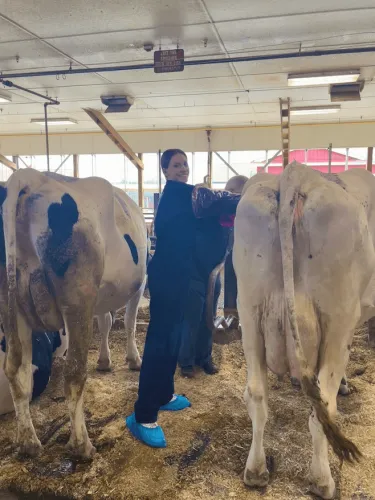
Overall, she summarizes here UVM experience this way, “I have learned so much from my time at UVM both in the classroom from professors and outside of classes from the amazing community of students.”
Wylie Roberts had a passion for ecology and the natural world throughout his entire childhood, but during high school he fell in love with maintaining a personal plant collection while also researching plant ecology and the role specific plants play in the environment. So, he knew he wanted to study plant biology in college. What made him chose UVM was access to the Pringle Herbarium, the second largest herbarium on the East Coast with over 360,000 sheets of plant specimens.
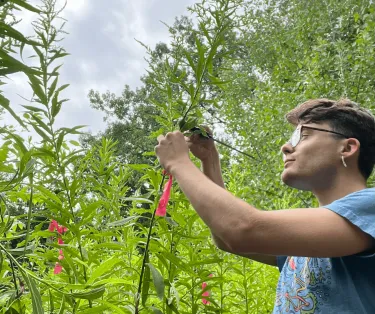
Wylie describes the advantage of joining a small department. “Because it is smaller, I felt completely comfortable approaching the then Pringle Herbarium Director my freshman year and asking how I could get involved. I was hired on as an assistant, handling intake of specimens, filing and sorting plants and accessing them. It was great to have a job on campus related to my major.”
Work with the herbarium led to the use of another talent of his, botanical illustration. “I think of myself as an artist in general, and I've been drawing for most of my life, but I took Botanical Illustration through the Department of Agriculture, Landscape, and Ecology, and I really loved the course. I had already been drawing plants before that, but it definitely got the ball rolling and it's something that I keep up with. In my personal art practice, I keep sketchbook-style journals, and botanical illustrations consistently make their way into those. I also produced a scientific illustration of an insect that made its way into my final thesis paper as supplementary information and reference material.” Wylie also did illustrations for the campus satirical publication, the Vermont Cynic as well as an illustration for the cover of an issue of Headwaters Magazine. In addition to his illustration work he also held leadership roles in the Horticulture Club, and participated in the Art Club. His Instagram features some of his illustration work: @wylie.illustration
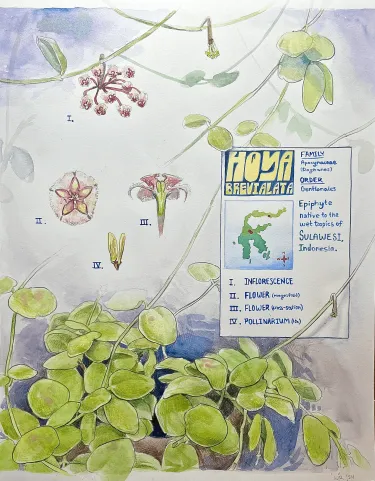
His first pivotal experience in his program occurred in his Plant Systematics course his sophomore year, “Just being able to get outside and sit down with a dichotomous key and identify everything that was growing around us. I really flourished in that class. It is the type of learning that really clicks for me, both the experiential part and seeing patterns, then making decisions off those patterns.
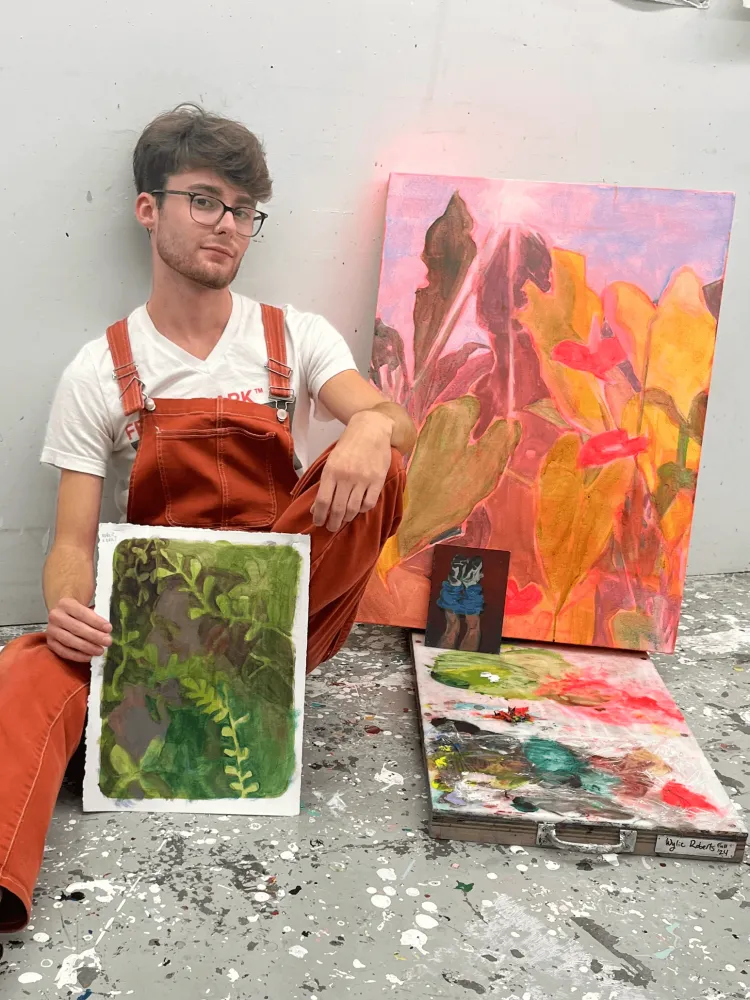
The second impactful experience was the winter travel course, Tropical Plant Systematics which studied tropical ecosystems in Costa Rica. “We visited four different locations, spending time in different ecosystems and habitat types. It was definitely solidifying in terms of me knowing that this is what I want to do with the rest of my life.”
“I loved both those courses because I could just feel my brain taking in all of that knowledge day-to-day, and I could just see how much I had learned. Now whenever I'm out walking or driving, I can just look at the side of the road and be excited by what I'm seeing, and start asking questions like, ‘What are those communities of plants and animals and what interactions could be going on there?’”
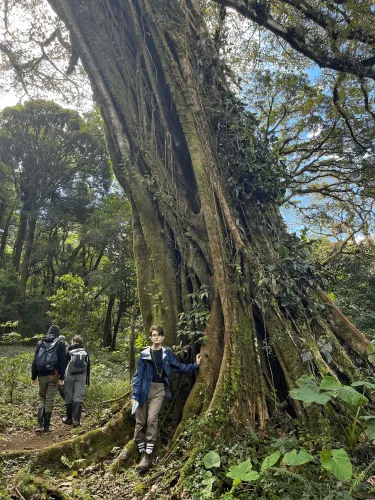
“Throughout my time here, in all of my professor/student interactions, there was a sense of dedication to the students in the program. Because plant biology is a small department the faculty could donate a lot of time and thoughtfulness to our experiences as learners.”
Wylie also was in the Honors College and he recently presented his thesis project. As for his post-graduation plans, Wylie says he needs a year or so break, during which time he plans to work in his field, then he would like to pursue graduate studies in plant biology.
Mariame Yangambi is a nutrition and food sciences major with a concentration in dietetics. She grew up in Burlington and spent her high school years visiting the UVM campus as part of classes offered in her Upward Bound program. At first, she didn't even consider UVM because she wanted to leave home. But because she's family-oriented, she thought she'd try it and see how it was, thinking she could always transfer out after a year or two. However she says that once she moved onto campus going to college in her hometown wasn't the issue she imagined it would be: "This school is so big, I didn't even feel like I was still in my hometown."
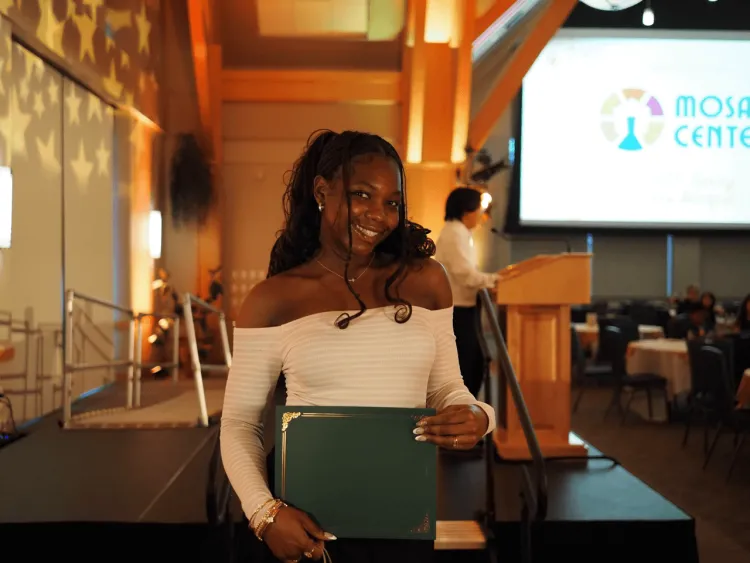
She enrolled as a biochemistry major with a minor in nutrition. But after her first semester, she wasn't enjoying biochemistry and had found a greater love of nutrition than expected. "I love the dietetics program, and the professors are really, really nice. As we move through the years, the classes in the program get smaller, and you start to build a cohort with your peers, and you see the same people in all your classes. It just makes it more fun, and it's easier to build relationships and make friends. I found a lot of support from my professors because it seemed like a personal connection was made with each professor that I had, and that makes it more fun to learn."
Mariame's favorite class was Clinical Nutrition with Dr. Kelsey Rose, a two-part course, one in the fall and the second in the spring. "I like this course because it's teaching me what to expect when working in the clinical setting, and it is teaching me how to build skills for the professional world as well. And it's taught by a professor, who you can tell loves her work, so it makes me love it even more. And she'll take time to make sure we understand everything that she's teaching us, and she'll take questions from us. If she doesn't know the answer, she'll let us know, and then the next class, she'll have the answer for us, and that gives me a reason to look forward to going to class."
As part of her degree, Mariame interned with Dr. Emily Stone, a registered dietitian at the UVM Osher Center. "I really enjoyed interning with her because she was just so open-minded about everything. She was a very calm presence, and I liked the perspective of working in a clinic because I've always imagined myself as a dietitian working in a big hospital and just consulting on cases. But I liked seeing the contrast of working in a small clinic, where you get to build more intentional connections with the clients. It made me realize maybe I want to work in a small clinic rather than a big hospital."
To round out her college experience, Mariame participated in several UVM groups and activities. "My friend started a dance group here at UVM. Just a few of us getting together and dancing, and we booked performances around town. That was a really big part of my freshman and sophomore years. Just dancing with my friends. But more officially I've been a part of the Black Student Union since freshman year, attending meetings and in my sophomore and junior years I was given leadership positions: This year I was Vice President for the Black Student Union, and last year and sophomore year I was a Leadership Assistant. As the Leadership Assistant I would help coordinate different events such as our Valentine's Day Social, and help coordinate general student body meetings, which happen every Tuesday in the Mosaic Center. Our biggest event of the year is the fashion show. Every year, the Black Student Union hires black designers from around New England to come and showcase their work. The students are the models. I've been a model in that show since my freshman year. And I'm also a part of the African Student Association which meets on Wednesdays, every Wednesday, and for that organization this year, I was asked to be the student advisor. Basically, I just give them advice on how to coordinate events, because I already know how to do a lot of that from being on the Black Student Union board."
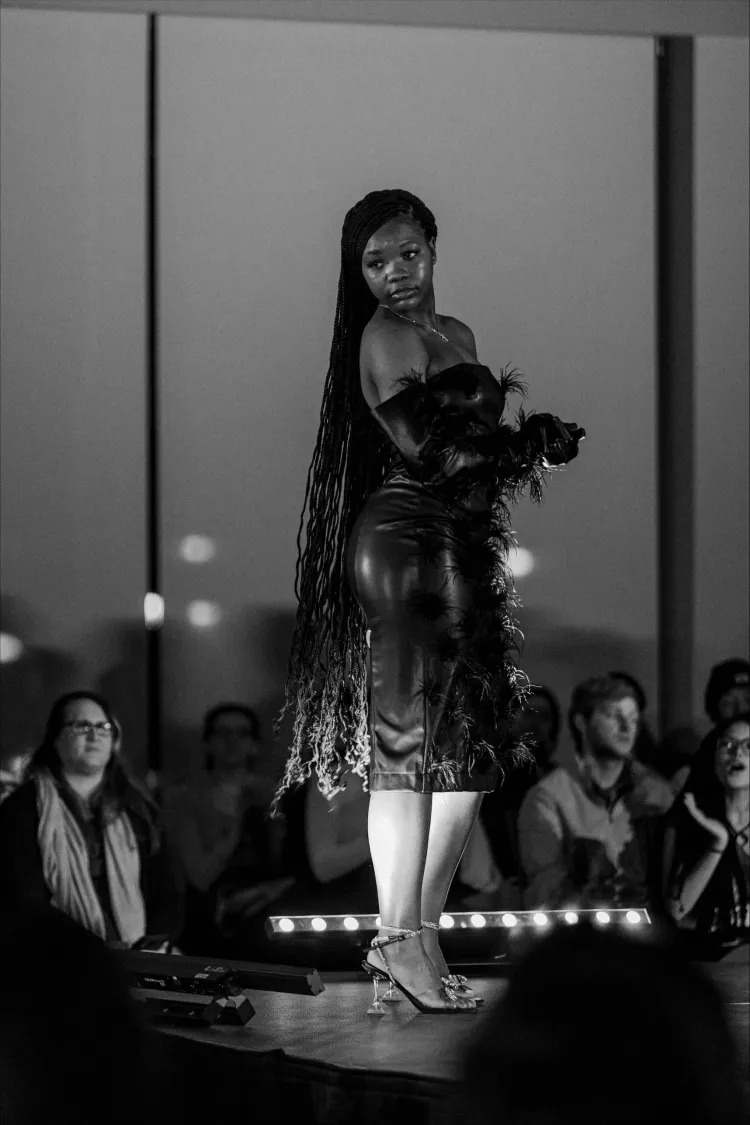
When asked about her leadership roles in these organizations, she laughs, "I didn't think. 'Oh, let me run for vice president at the SU.' I was asked because of my presence in the club, and because I've shown up over the years. It's kind of unintentional leadership that I've had to grow into, but which I really like because it's really fun to help people."
She describes the evolution of her leadership capabilities as stemming from being in higher-profile positions in these organizations, "People come up to me and ask about my experience at UVM as a black or an African student, and I've had to speak to people about not transferring out of UVM. Most of the students that I know are from the Bronx, or from New York, and they're used to being around a lot of diversity, a lot of black and brown people. But UVM is not always that. Usually, I emphasize that it's so important to find your community so that you can thrive in that community, and it may take time. But there are so many things, so many different organizations and events at UVM that you can explore."
Her exemplary leadership was recognized this semester when she was awarded the College of Agriculture and Life Sciences' Inclusive Excellence Award, which honors students who have championed inclusive excellence during their time at UVM.
Born in the Democratic Republic of Congo, Mariame has known Congolese food all her life. As a Congolese woman and as an immigrant, she hopes to bring her cultural knowledge of food into dietetics. "One of my biggest goals is to broaden representation in the field of nutrition because food is at the center of everybody's lives. It's important to realize and understand the cultural meaning of different foods for different people, and to help them to become healthy in a culturally responsive way."
Mariame plans to be a student again this fall when she starts graduate school at George Mason University in Virginia. "My goal is to do my Master's of Nutrition and Dietetics, complete my dietetics internship, and then take the dietetics exam in two years, and become a registered dietitian, so that I can be the representation for my community and my culture in the field of food, nutrition and dietetics."
Carter Wallace officially graduated in December with dual degrees. He earned a B.S in Microbiology and a B.A. in Health and Society, and received the distinction of graduating Phi Beta Kappa. Still, his resolve to graduate a semester early hasn't deterred his enthusiasm for walking across the stage and participating in the graduation ceremonies in May. He's looking forward to sharing the day with his family, particularly his grandmother, his only living grandparent. "My grandmother was a nurse for her whole career, and no one else in our family has ever gone to medical school, so she and I share a special bond around my career choice."
Since his early graduation, Carter has used his time to prepare his medical school applications, and he's been busy completing and filing those this spring. "It was nice to graduate a little early and to be able to have the spring to ease into the post-grad life a little bit."
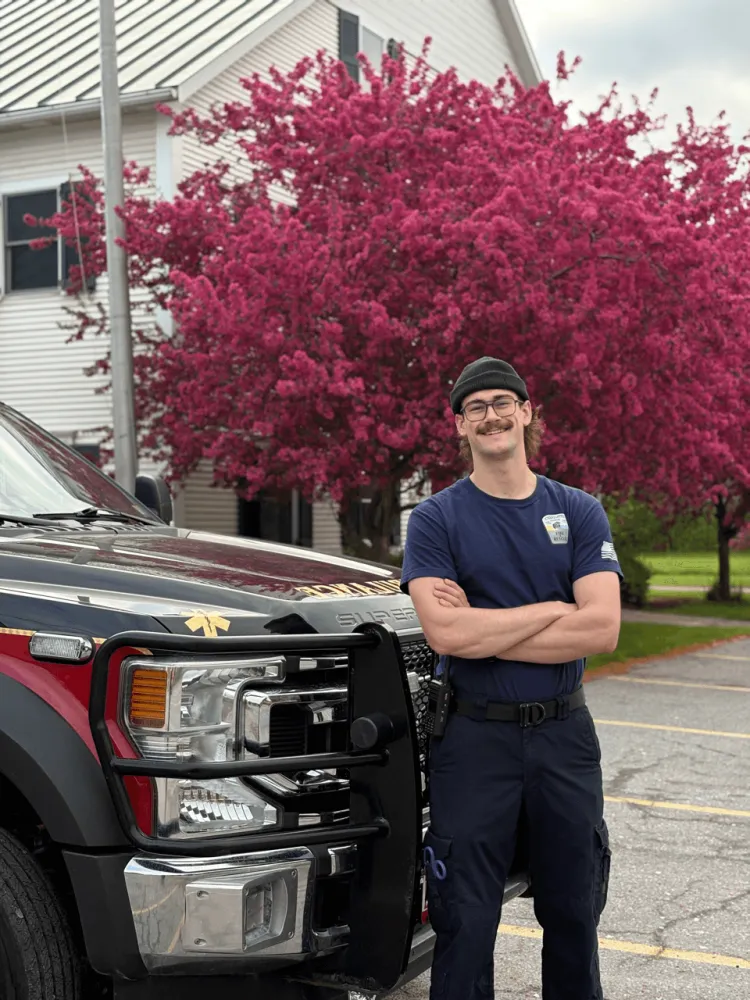
He grew up in Massachusetts about a half-hour from Boston, and he knew he wanted to go to medical school when he started at UVM. "I decided that as a senior in high school, and so I wanted to do something in biology. But I didn't want to do general biology. I wanted to focus more on human health and infectious disease stuff. So I found microbiology and though didn't know a whole lot about the major going into it, I was very happy with it. And after the first semester, I was like, 'Yeah, this is definitely for me.' Then I had a friend who was a health and society major. I was interested in public health and some of the other aspects of medicine, and didn't want to just be confined to the physical sciences, so I added the health and society program." His second major allowed Carter to take courses from other departments, such as anthropology, sociology, and political science.
He credits the pandemic for influencing his career choice, not directly because of the public health emergency, but more because of the months stuck at home, which gave him the time to research a career in medicine. Though he feels he would have ended up with this career path without the pandemic, "COVID and everything that happened made it seem a little more important."
Because of the pandemic, he couldn't tour his colleges of choice and only applied to five schools, all early action. However, he chose UVM primarily because of UVM Medical Center and the access to medical college faculty. "I wanted to go to an undergraduate school where there was a medical college and an academic medical center on campus."
Once at UVM he took advantage of this proximity and began working as an ER Technician in his sophomore year. "At UVM, you can live on campus and work in the hospital, and that's what I did. And I could walk back home to my dorm at night after working my job in the ER. It worked out well, and I've been able to do research, and to make connections with other hospital staff. It's been a great community. I've made some of my best friends there. I've had a lot of true mentors there, too. You get to do a pretty wide scope of what doctors do, and the emergency department works with almost all the other parts of the hospital, so it's been a really great learning experience."
He took his Emergency Medical Technician Certificate in high school and also began working as an EMT right out of high school. He continued to work with ambulance crews for the rest of the pandemic and throughout his college career and summer vacations.
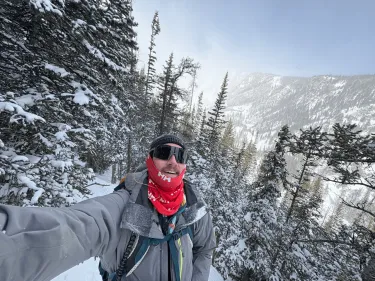
Carter also worked in the lab of Dr. Ben Lee, doing research. He primarily worked on an assay evaluating human immunity generated against the rotavirus by vaccines. Rotaviruses are one of the main diarrheal diseases that affect lower-income countries, and children are particularly at risk. Carter helped fine-tune Dr. Lee's assay to detect antibodies and then made a standard curve to be used for human serum samples. That tool was then shared with Dr. Lee's colleagues in other countries so that they could evaluate how well the vaccine was generating antibodies against rotavirus. "It was a good mix of microbiology with public health and infectious disease research. Dr. Lee is an MD. He's a pediatric infectious disease doctor at the UVM Medical Center. Pediatrics has been an interest of mine, and I recently shadowed him for the first time. I got to go around on some of his ICU patient visits and also see some patients in the clinic. It was a great day."
When he was applying, he didn't realize the size of the Department of Microbiology and Molecular Genetics (MMG), but he credits MMG's small size with big advantages. "In my Senior Seminar, there were about 20 of us, and I was with most of the same students that were in my first-year colloquium. We were presenting twenty-minute research projects on topics we wouldn't have been able to comprehend four years ago. It was such an intimate program, and to have upper-level courses with 20 or 30 people doing specialized things like virology, or cancer, or genetics, I was really happy to get to know all the people in MMG so well."
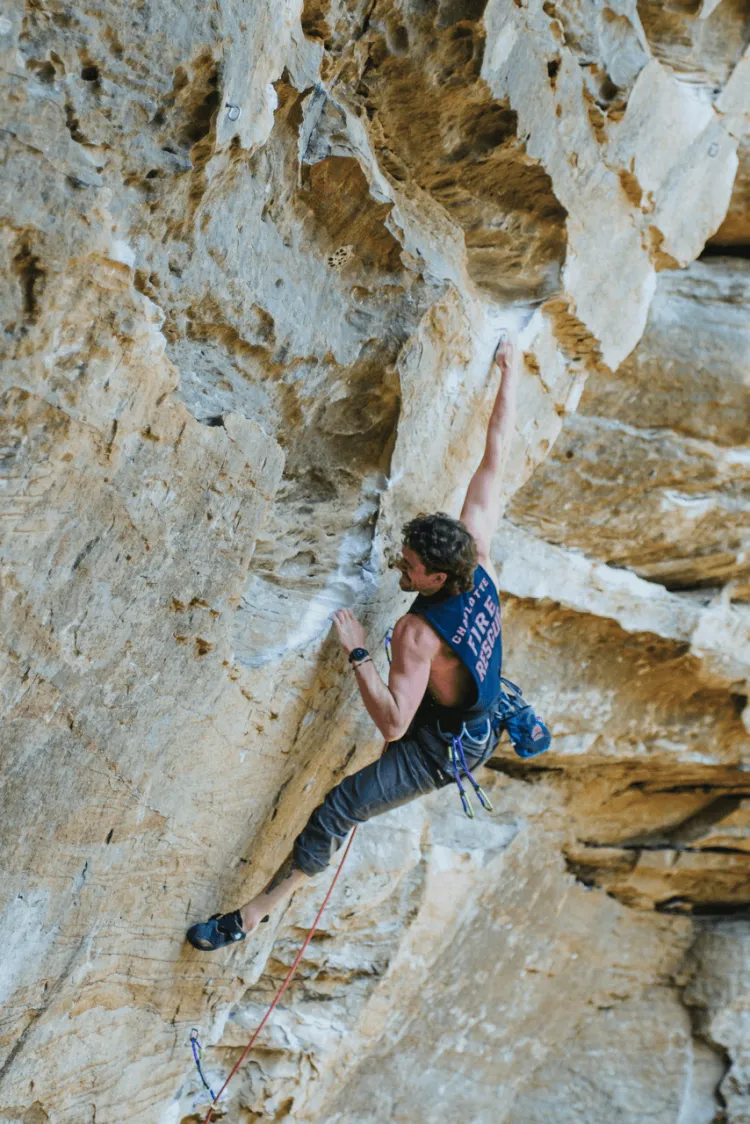
Carter is also a big rock climber and skier, and though these were not his main reasons for choosing UVM, those passions certainly added to the pleasure of his time at UVM. He served as the Safety Officer for the Competitive Rock-Climbing Club for three and a half years. "That's honestly how I met most of my best friends from college. We met through climbing, and it was great to have the structure of being able to go and train and practice with them a few days a week. Almost every Saturday in the fall we would go up to Smugglers Notch to go bouldering, and then that same group of us have gone on spring break together the last three years. In our sophomore year, we went climbing at Joshua Tree, and in our junior year, we climbed at Red Rocks in Las Vegas. And then this past year, when I was on my post-graduation road trip, my friends who were still in school met me in Boulder, Colorado, and we went climbing and skiing out there. That was my primary university-related social group because most of my other time outside of school was spent either in the ER or working on ambulances."
When asked about his favorite aspect of his time at UVM Carter summarized his best days this way, "It would be some weekend where I'd be able to go out and go climbing at a local spot with my friends on the climbing team, get back and work a 12-hour shift in the ER from 3:00 PM to 3:00 AM, and, you know, learn a bunch. Have a bunch of fun there with all my friends at the hospital, and walk across campus, sleep in the next day, and then be studying at the library with the same friends I was climbing with the day before. It felt full circle at UVM. It was cool."
Miranda Degreenia grew up in Walden, Vermont, a town of just under a thousand residents in Vermont's Northeast Kingdom. By comparison, Burlington seemed to her like a huge city. "I love Burlington and I love Vermont, and I wanted to stay here and focus my studies and efforts on Vermont and local communities."
Miranda began as a global studies major, but her high school Upward Bound program director was an alumnus of the Department of Community Development and Applied Economics (CDAE). When he heard that she was headed to UVM, he suggested that she check out CDAE's community and international development (CID) major because he knew it would align with her career goal of working in nonprofit management.
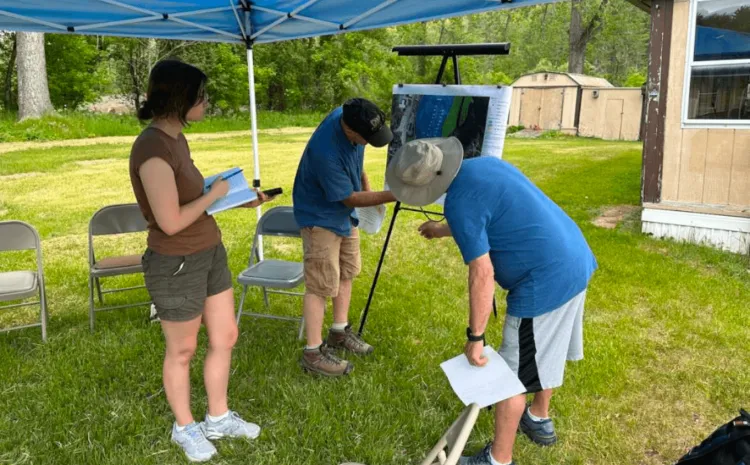
She also originally had a minor in food systems. Though she remains interested in food systems, she changed her minor during her first semester to reflect a new understanding that public communications overlapped more with her choice of major, "It's the fundamental piece of working with communities, you know, communicating with them, learning their needs, and learning how to empower them to make decisions on their own that'll benefit their community."
One aspect of her major that she found most engaging was how transdisciplinary it was. "I liked that it didn't prescribe a certain path but enabled me to find my own way. We explored the communication aspects of CID. We explored the sustainability aspects and the economics, and I've become interested in all those topics too. But you can find what you're actually interested in and then pursue that. So, I've gone more down the lines of community outreach and communication, even though I'm also involved in research and economics. It helps you build a really broad skill set, too, so that you can go into any job that you're interested in. I feel like I've been enabled to go out and actually get a job and do what I want to do with all these skills that I've learned."
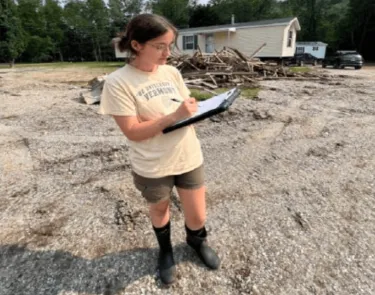
In her first two years at UVM, she wrote opinion pieces for the Vermont Cynic and articles for the culture section. She got more involved with her CDAE community over time, including being a teaching assistant for Kelly Hamshaw's Sustainable Community Development class and Ben Dangl's Strategic Writing for Public Communications course. "Being a teaching Assistant has allowed me to really, really connect with students and all the professors. And I feel like I've built strong bonds through my TAships."
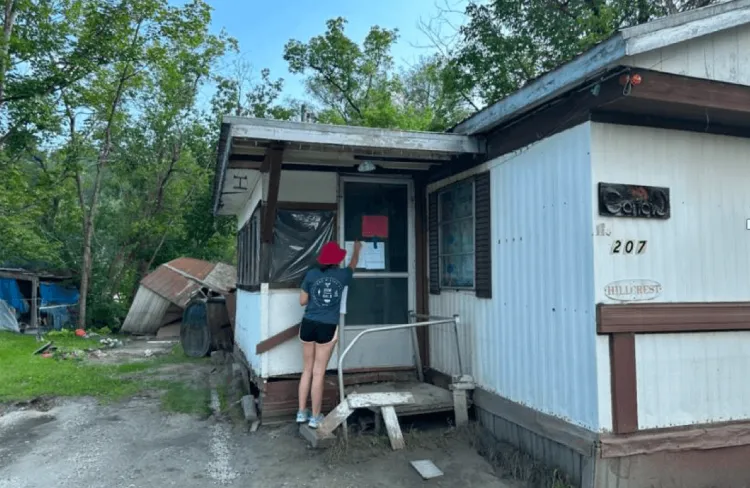
Unlike most of her graduating classmates, Miranda will remain on the UVM campus for one more year to complete her accelerated Master of Public Administration degree. "I'll graduate with that in spring 2026. In the meantime, I'm working at Shelburne Farms. I've been there for the past three seasons, working at the restaurant and doing events. Working at Shelburne Farms has gotten me very interested in outdoor education, community outreach, and the role that nonprofits can play in community development. So, I can definitely see myself working for a similar agricultural or educational nonprofit in the future. And I'm also really interested in housing. I've done research with Dr. Kelly Hamshaw on flooding in Vermont's mobile home communities. And I'm interested in the role that housing plays in people's lives, and how it can be a pathway to economic mobility, personal growth, and things like that. It really is the building block for all of those things. And so, I could definitely see myself working for a housing nonprofit. I interned with the Champlain Valley Office of Economic Opportunity in 2023, and I became very interested in housing while I worked there. So, I don't know the exact path I want to go down, but I know it'll either be housing, food, or outdoor education. And I think that's a pretty good start, because I just want to help people."
Molly Toner began UVM as a business major. Originally from Milton, Vermont she wanted to go to a college with lots of options, “to just try a bunch of different things." She joined UVM's service dog training club, United Puppy Raisers of ACTS and their Wagging Retrievers (UPRAWR) to learn to train dogs, the Japanese Buddy Club where she had the opportunity to assist Japanese students in the acclimation to college life in America, and also the anime club. However, the club that changed her trajectory was when she attended the Dairy Club in her freshman year. When she met the cows in the UVM’s Cooperative for Real Education in Agricultural Management (CREAM) program she knew right away that she wanted to change her major to Animal Science, “I decided I should study what I love and what I’m passionate about.”
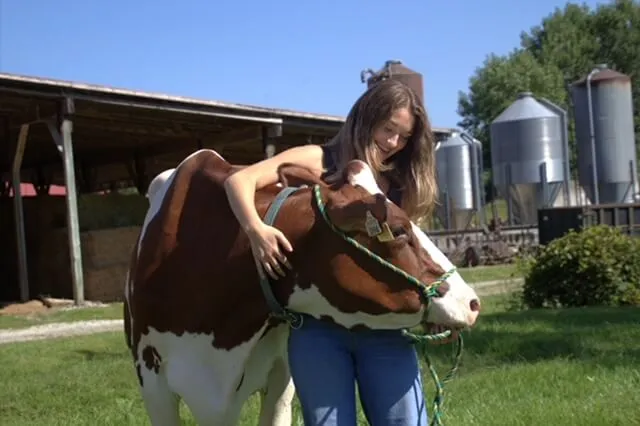
Students in the CREAM program perform all the day-to-day care and management of the UVM dairy herd including staffing the 4AM milkings. Through the CREAM program she also had a lot of opportunity to work with youth, “CREAM hosted the 4-H Bovine Bonanza, and other events, and I discovered that I really loved teaching kids.”
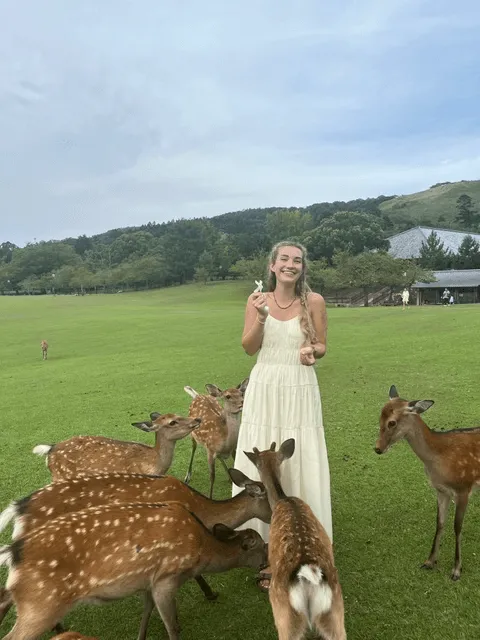
Molly will receive dual degrees. She's earned a B.S. in Animal Science from CALS and a BA in Japanese from the College of Arts and Sciences. Dual degrees meant that she had to complete all degree requirements for both colleges, which she did with high marks. She’s graduating Phi Beta Kappa.
To deepen her knowledge of Japanese culture and increase her proficiency in the language she spent a semester during her junior year living in Japan. She studied for four months at a university in Osaka taking courses instructed almost entirely in Japanese. She lived in a dorm and spent a week living with a Japanese family that only spoke to her in Japanese. “Almost every single day that I didn't have class, I was going to a different city by train, which was so cool.
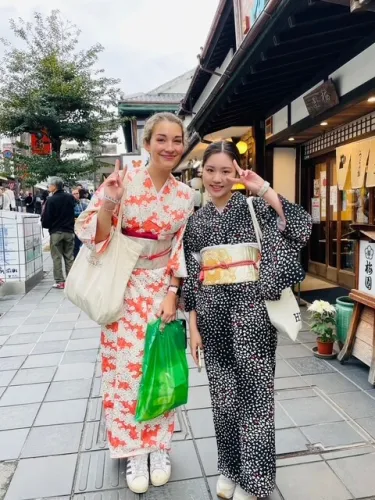
Before I went to Japan, I thought that I didn't want to be in Vermont anymore, but then when I went over there, I definitely realized that I want to stay in Vermont. I missed it so much.”
She hopes to make a career out of something related to teaching in either the field of animal science or Japanese.
Emily Batinsky remembers starting UVM in the middle of Covid with the need for social distancing and masking. "My very first class was with Dr. Todd Pritchard, and I remember being in this huge lecture hall in the basement of Billings. Dr. Todd asked everyone to spread out, which was weird because we were all three seats away from anyone else. Yet it was really cool to finally see people again."
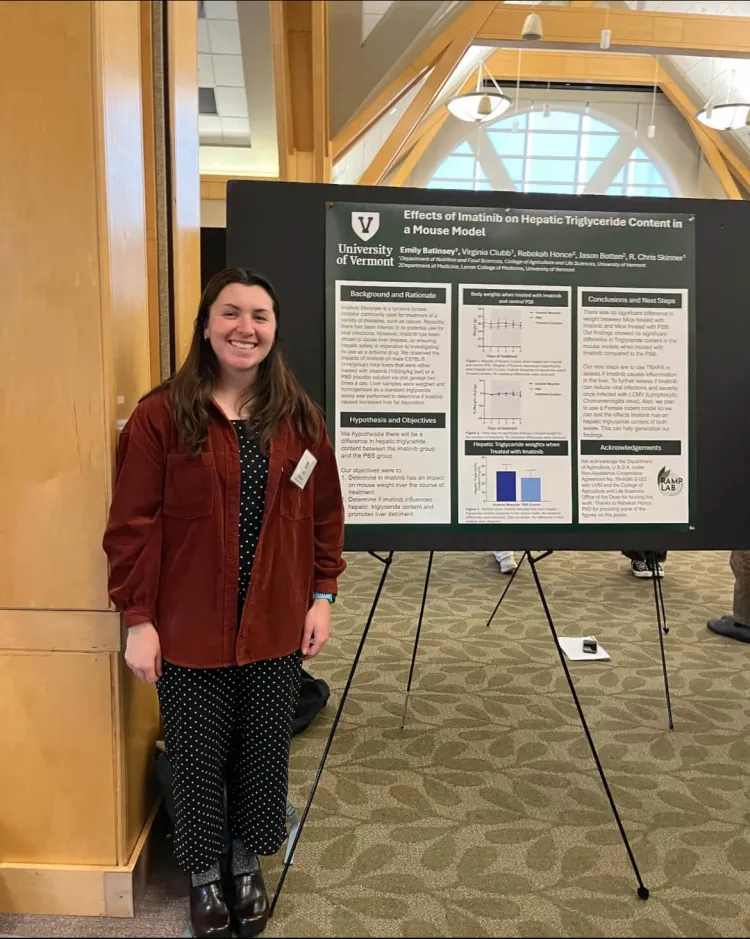
She wanted to go into dietetics when she first started at UVM, "I've always been very passionate about food and cooking, and I've always been an athlete as well, so nutrition was really big for me when I was in high school. Nutrition is my fuel, so I wanted to stick with that, but I realized along the way that I really enjoyed food science more."
Though she chose to major in nutrition and food science, she had no experience with actual food science until she took a course with Professor Laura Olmstead in Kitchen Science. "I didn't realize that there was a whole discipline on all the different chemical processes that happen when you're cooking." That course led Emily to do a summer research internship with Dr. Olmstead, during which Emily researched high school science curricula and then tried to incorporate topics that Dr. Olmstead had taught her in the Kitchen Science course. The results suggested food science experiments that meshed with general science topics from Vermont high school curricula.
Emily's choice to attend UVM came down to hearing about how passionate UVM professors were, and she was not disappointed. "They love what they do. They love what they teach, so their enthusiasm gets passed on to every student."
Emily feels this made it easy to make connections with many of her professors, and one connection she believes really altered her experience at UVM was with Dr. Beth Bradley, who assisted her in forming a club in the middle of her junior year. "It was just for fun because there were no food science clubs here to explore our passions for recipe development."
Emily and four other students came together to make a club to develop a product and enter it into a dairy contest. The competition was to design a dairy product that met specific health requirements, and college teams competed against other schools such as Cornell, the University of Michigan, and Florida State. "It was big for us because it was our first time doing it. So being able to sit in a lab and/or kitchen and develop a product, and come up with new ideas was really cool. It shifted my idea of food sciences, too, because some of it is just science-y, and another part is very creative because you get to go in the kitchen and invent stuff. That opened my mind for what this field could be."
The team developed a Chai-based yogurt drink with higher protein, which benefited from the anti-inflammatory and antimicrobial properties of the different herbs in the Chai. They also added some maple syrup to give it a little Vermont twist.
Dr. Bradley also provided entrée to another significant UVM experience when she introduced her to the quality assurance team at the local Zero Gravity brewery. The introduction led to an internship with the brewery in the fall. She was surprised by how innovative the work was," The craft beer industry is very technical and analytical -- they do love their food microbiology – but they are also very creative!"
During her internship, she realized how much she had gained from her coursework. "It was just very cool to be able to step into the industry after learning so much in my classes, and I was just kind of pushed into it, and they were like, 'Hey, apply all this stuff' and I really understood when I was there just how much I had learned at UVM. And then I got to learn so much as well from the team at Zero Gravity."
Her internship and her work in her food science courses have given her a focus for where she might want to begin her career. "I got to explore a lot of different paths and to explore who I want to be after college, and what I want to do after college. I really enjoyed my food science courses here at UVM and am considering going into food safety and regulation."
In her final semester at UVM, Emily took a Hazard Analysis and Critical Control Points (HACCP) course. HACCP is a food safety control system that identifies and controls potential hazards to ensure food safety from production to consumption. It utilizes a systematic analysis to predict and control potential risks. "Learning how to write a HACCP plan is going to be a great skill for me after college, especially if I want to apply to a quality assurance role in the brewing world or the food system world."
Emily is originally from Ronkonkoma, New York on Long Island, and she didn't have a lot of connections to the food system before coming to UVM. Nevertheless, she chose to minor in food systems. "There are no farms, so coming to Vermont was a whole different world for me. I got to learn what farmers' markets were, and I got to see farms, which was kind of a culture shock for me. Taking food policy courses and food systems courses gave me an understanding of how the food system impacts nutrition."
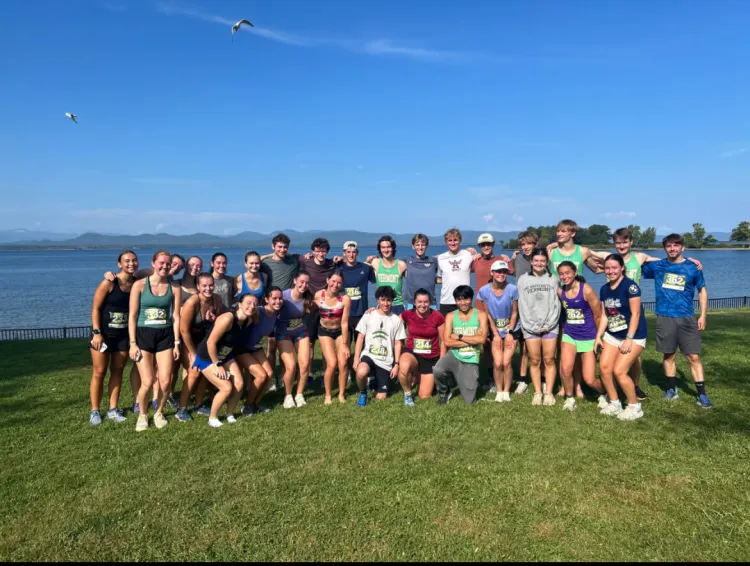
Running continued to play an important role for Emily while at UVM, and she was both the Vice President and the President of the running club. In addition to applying for food science jobs in Vermont, going on several interviews, and making plans to celebrate graduation, Emily has spent the last couple of months training for the Burlington Marathon. "I will get my diploma and then I get to run 26 miles in the city that I love. The city I got to be a part of for the last four years!"
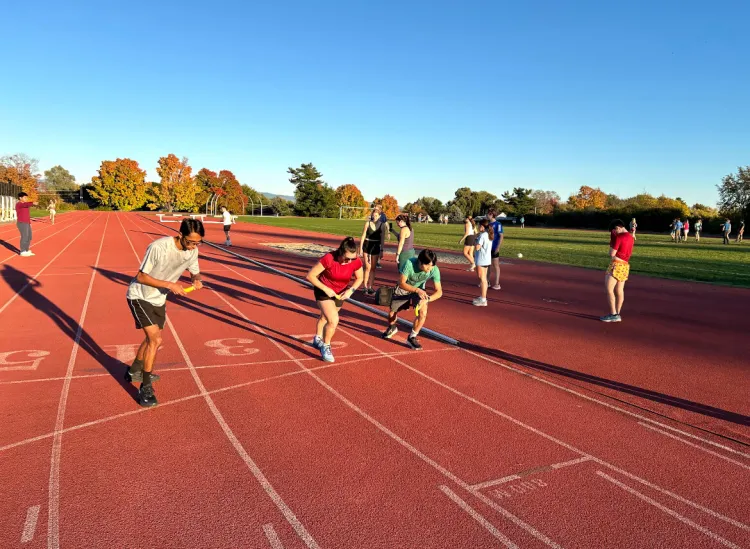
She's optimistic enough about her job prospects that she has already re-signed her lease to stay in Vermont. "I'm excited about just getting my feet into my field a bit. I would love to go back to the craft brewing industry because of what I mentioned and how creative it was, but also, I've learned that you can do food product and recipe development anywhere, so I just want to start by gaining more experience."
Emma Meyhofer arrived at UVM having never even visited Vermont, never mind the campus, but she was ready to experience something other than her hometown of Pittsburgh, Pennsylvania. She chose the Department of Agriculture, Landscape, and Environment (then called the Department of Plant Soil Science) because she was interested in both landscape design and food systems, and she's been delighted with her decision. Having courses that covered both agroecology and landscape design has made her feel prepared for a career in either profession, though recently she has begun to focus more on the landscape design side of things. During UVM Research Week, she presented her work at the Landscape Design Senior Showcase.
Her minor in business gave her a broader background in entrepreneurship. It taught her how to manage the financial side of running a business and marketing, whether an agricultural enterprise or a design firm. Not knowing anyone in the state when she arrived in Vermont, she participated in the Outing Club and the Horticulture Club in her early semesters. She admits that once she met more people on campus, she participated less in the official student clubs and instead spent much of her free time skiing with friends, which gave Vermont's snowy months an exciting outdoor focus.
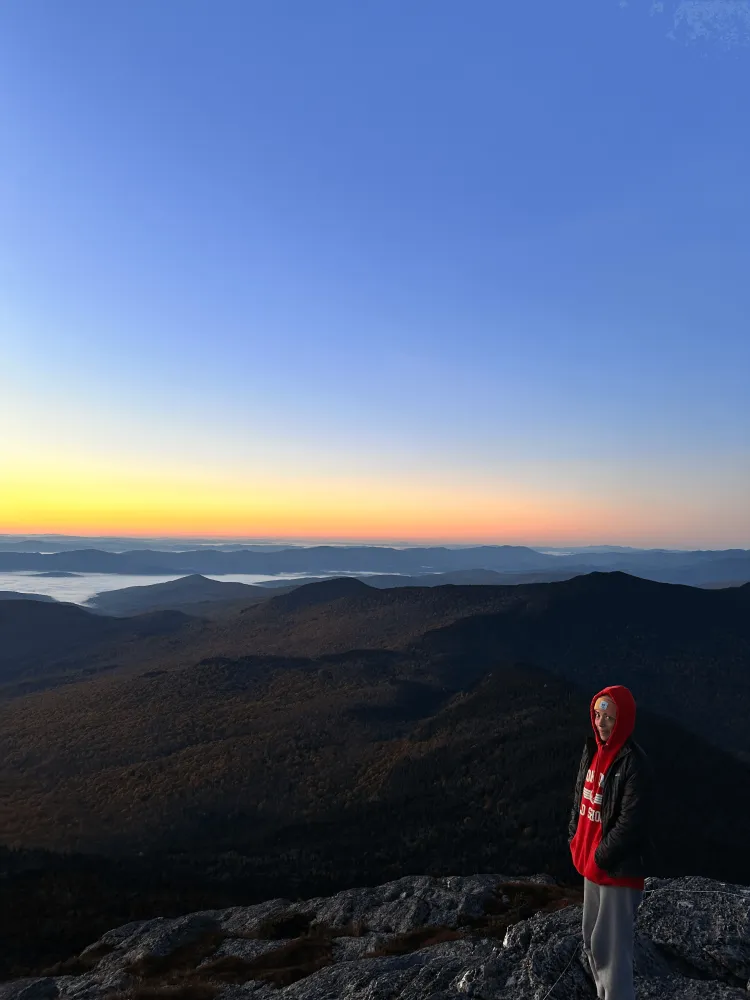
Her desire for hands-on, on-the-job training and her passion for travel were combined during her program, as she was able to do an agricultural internship in Italy in the summer between her junior and senior years. She stayed at a vineyard, focusing on tending their grapes, working the farm, and caring for the farm animals alongside several other farmhands. After graduation, she plans to head to Bali for a few months to work on agricultural and design projects.
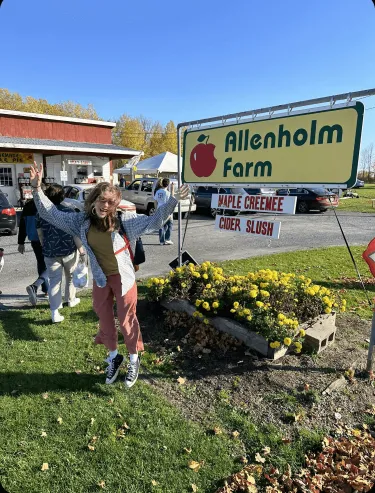
Overall, she feels her UVM education has been a solid preparation for the life she plans to lead, "I've gotten everything that I really needed. I got some space from where I grew up. But I now find Burlington to be a little small for me. So, I'm excited to branch out and do more things. When she returns to the USA from Bali, her goal is to move to NYC and to begin her career in the field of landscape design.
Congratulations to all of the 2025 graduates! You've made CALS proud.
The schedule for the 2025 commencement activities is available here.
